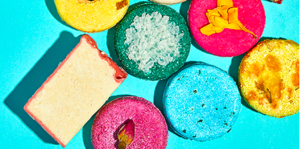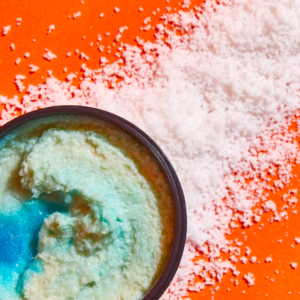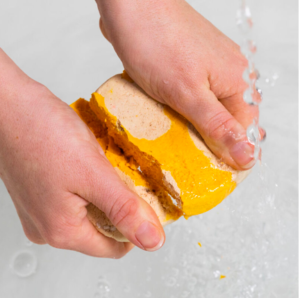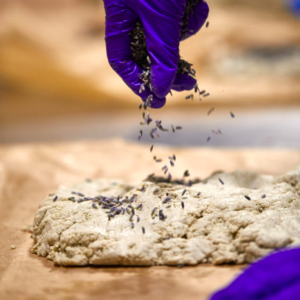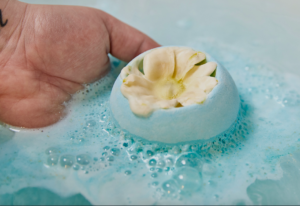Let me preface this by saying, this is an educational exercise and these are my opinions, it’s meant to be fun and a way to demonstrate what a brand is made up of that isn’t actually a logo. So, I’m not going to talk about logos or design in these case studies. Instead, I’m going to focus on those important brand foundational elements that make up a total brand.
The key with branding is that perception is reality. So if your consumers are perceiving something from your brand, then that is what is true. So your goal or your job as a brand owner, is to make sure that you’re shaping that perception to what you want it to be and what you want them to see.
I thought we’d start with LUSH and their brand foundation. If you’re not familiar with them, LUSH is a cosmetics retailer. They make and sell products for the bath and shower, hair, face and body, using only vegetarian recipes, 85% of which are also vegan.
LUSH keeps things simple, sourcing fresh, quality ingredients that aren’t tested on animals and sold fresh to customers. From bath bombs, creams, shampoos, cleansers, lotions, scrubs, masks and more; (personally speaking) their product looks, feels and smells amazing!
A brand foundations core five elements are: purpose, values, beliefs, personality and tone of voice. I’ll also touch on their value proposition, the brand benefits that they deliver to their people, their audience, and the reasons to believe (those are the things that brands need to have in order to prove that they know what they’re talking about, or that they have credibility in the space). And then lastly, but still equally as important, impact, because I think it’s a really significant thing for brands to be considering as part of their foundations. That’s my lens on brand building, because otherwise what’s the point 🤷🏼♀️.
Purpose
To change the cosmetics industry for the better of people and planet
LUSH was birthed in 1995 after a few previous iterations (one of which providing formulations to The Body Shop). Their last business had ended in receivership, so founders Mark Constantine and Liz Weir launched in a simply designed store with simple packaging, in very humble beginnings. Both founders were interested in natural beauty products and having worked closely together since the 1970s, they wanted to use their skills as a trichologist and a beauty therapist to make better products that weren’t harmful to people or planet. LUSH was born out of their own personal passion and curiosity.
Values / Beliefs
LUSH has a strong foundation of core values and beliefs that guide their every move and translate to how they source, to how they sell from a business model perspective, through to how they engage their customers from pre-purchase through to post-purchase.
LUSH’s Brand Values might look like:
- self-care
- beauty
- transparency
- sustainability
- fun (and immersive) sensorial experiences
Their products really are super fun, and they’ve made it about the experience that you create when you’re using the product. For instance, you always know there’s a LUSH store somewhere simply because you can smell it. From the moment you open up a new jar of product and use it for the first time; or drop a brightly coloured bath bomb into the tub and listen to that fizz, watching the paint-like hues mix and merge: every moment in the customer experience has been thought through and you can tell that it’s been crafted from a place of curiosity and experimentation. It feels like a truly human-crafted experience.
LUSH Brand Beliefs might look like:
- An industry that fosters beauty should not have ugly consequences on people or the planet
- Happy and confident people make for a positive world… and that starts with unashamed self-care
- Totally LUSH experiences touch every sense to inspire and imprint on memory
Their brand experience is about fun, beauty, self care, but without negative consequences (i.e. not at the expense of animals and not at the expense of the environment). As such, they’re very big on sustainability, plastic-free packaging and business as a force for good. These are all outlined beautifully in their Ethical Charter.
Personality / Archetype / Tone of Voice
From a personality perspective, they’re really approachable and fun. If we’re talking about archetypes, (and I do have a blog about Maslow’s Hierarchy of Needs and Archetypes, so if you’re not familiar and you’re interested in learning more, you can read all about them here) they’re mainly a Hero archetype with a little bit of Lover. Hero in that they are on a mission to change things and because of this, they want to rally community together around them, around their cause, and make change happen in the industry. And also, the Lover, because they celebrate personal self care and enjoyment, coupled with what’s good for your body is good for the environment. There is a celebration of lovely, totally lush experiences that also plays an important role in shaping their brand personality, and a leading trait of the Lover archetype.
From a tone of voice perspective – or the way that personality is executed in their communication – their’s is honest, down to earth, young, vibrant and bold. They’re very straightforward in their copy. You’ll notice that all of the staff that work at large stores are very well briefed, very much approachable and have that same friendly kind of vibe. It’s apparent that they recruit based on those values. Equally as important is the use of product as well. When you’re shopping in store, everyone seems to be having a great time and they genuinely really do love the product. This tone of voice holds the same note (see what I did there?) and comes through in their copy on their website, on their social media, as well as in their associates in the store you’re interacting with as you shop.
Benefits
In determining brand benefits, it’s helpful to know which need of the hierarchy that you’re fulfilling and thus, the benefits you’re delivering to your audience. If you’re asking yourself, “what hierarchy is she referring to?” only my favourite, Maslow’s Hierarchy of Needs that I break down in the same post where I discuss archetypes. Look, it’s a good one (if I say so myself) and conveniently, you can read it right here.
But I digress… identifying your need, and delivering those benefits to your people, really helps you clarify, where and what role, you play in their life. For instance, is it a fundamental physiological need that you’re addressing or is it higher up in terms of a higher order need?
For LUSH, that need is esteem – because of what using the brand says about the person (internally – to oneself, and externally – to others).
In store, they cut up a big chunk of handmade soap while I’m in there, and wrap it up in paper that can be recycled, or I can bring back my pots and then they’ll recycle them there. If shipped, the product is wrapped in biodegradable cellophane or paper, with biodegradable packing materials. These functional benefits mean “I’m making better choices for the environment” and emotionally, “I feel good about myself “.
Just like that very iconic black with white chalk-like script on the packaging acts as a cue and says something about me as a person if someone sees those fresh, handmade products on my bathroom shelf. The emotional benefit linked to the esteem need is the external validation one gets: “Look at my amazing glowing skin. Comment and tell me lovely things about that and I’ll tell you all about the product that I’m using” and internally “I’m looking after myself and am doing the right thing by my body”.
Audience
LUSH products are fun to use and reasonably priced. This makes them very accessible to the majority of people. LUSH stores are found inside major shopping centres or hubs, meaning they’re attracting a mainstream audience (as opposed to a smaller, more niche audience). They’re enticing every day consumers (who may or may not be eco-conscious) to walk in their door, have fun with their staff, buy their product and have a whole sensorial experience while they’re in there. But, they’re introducing a new audience into their ethical space and social enterprise and imprinting their sweet-smelling, positive vibes to ensure they come back again.
Reasons to Believe (RTBs) or Proofs Points
A huge part of LUSH’s ‘reasons to believe’ is the fact that they are actually activists, they are out there fighting with campaigns, challenging different causes, and actively pushing for change in their industry and the broader space that they’re operating in. Knowing that it’s not just cosmetics that they’re selling but that they’re living and fighting for a bigger, brighter industry and world. Some of the ‘reasons to believe’ that prop up their credibility in this space and give them that authority to be speaking about different causes, is the fact that they’re cruelty free in what they make and how they operate. Because of that, they have several campaigns behind them in terms of trying to make this change more widely practiced in the cosmetic industry.
Their list of proof points:
- Cruelty free (no animal testing logo endorsement)
- Ethical buying (validated with transparent charters and policies)
- Handmade (picture of the maker on every pot)
- Naked packaging and recycling program (not just saying you should reduce plastic usage and / or recycle, they help you do that)
- Activism (participating and contribution to many social and environmental causes, they act as a voice to what’s happening)
- Social proof from happy customers and user-generated content
- Since 1995 (providing heritage)
- Trichologist and beauty therapist working together since the 70s (these guys know their sh*t when it comes to cosmetics)
Value Proposition
A value proposition is a statement of how you uniquely deliver value to your customer. It can be expressed a number of ways, but a simple structure is We do [what], how [what makes it unique], for [whom]. So what is the value that LUSH are providing that’s unique to anyone else in the industry?
Their value proposition might be expressed like this:
Only LUSH make fresh, handmade ethically-sourced beauty products wrapped in fun (not plastic) for people who care about their body and the planet.
Those are things that not everyone in the cosmetic industry can deliver. For many businesses, they can’t deliver fresh because you know it comes from a factory. LUSH is very proud of the fact that real people are making the product by hand and putting each piece on the shelf. It’s incredibly cool that you’ll see the face of the person that has made the product as well as their name on the label. Simply reinforcing their handmade promise.
They also include the made on date and the use by date so you’re reminded that it’s fresh and has a shelf life. This is something that is quite unique, especially in the cosmetic industry. We have fresh and handmade, but it’s also about ethical. Their product isn’t tested on animals, you know all the ingredients are ethically sourced and they source quality ingredients. They explain and list all of their ingredients. If you shop online you can see what is in the product and where it’s being sourced. They talk about their suppliers and give complete transparency in how the execute their value and beliefs.
There is a beautiful wrap up of their values and beliefs in their value proposition in that you know only they can deliver these beautiful, fresh, handmade, ethically sourced products; and then there’s the fun aspect. The colours, the smells, the textures, the presentation, all of it, is FUN.
Impact
For LUSH, it’s evident that the importance of having an impact is rooted in who they are, how they make their product and in what the do. From creating charity pot, where 100% is donated to causes they are partnered with to using their platform as a voice to campaign for other causes. They actively campaign and are activists for various causes that are related to their industry and beyond.
You can believe they are having a positive impact because you can see it and be a part of it. It’s all wrapped up and tied into their core values and beliefs around what the cosmetic industry should look like and could look like in a better world. They make these changes accessible to people and it not only demonstrates but encourages that this is something broader cosmetic businesses can be doing.
Marketing & Advertising
And how do these brand foundation elements inform their approach to marketing and advertising? Well, LUSH doesn’t spend on advertising. Unlike other mass market brands who might invest in high production TV commercials, outdoor, online or social media, LUSH does not. Like their products, they’re as close to natural as possible by taking an ‘organic’ and word of mouth approach to their marketing.
They rely on the product and in-store experience underpinned by their brand story to do the hard work for them. This is a true example of how brand foundations drive business behaviours and actions. And in turn, this allows them to keep their focus on high quality products that don’t have to carry the cost of excess advertising in their price – keeping them accessible to more people.
Just like people, no brand is perfect. Even LUSH have been criticised for their weaknesses in their actions when it comes to ethical and environmental credentials. The point is, however, that LUSH have made a commitment to address these issues and continue to be guided by their core values. Their ability to reach a mass audience is a huge opportunity to raise awareness about important social and environmental issues. That’s certainly not a position every mass cosmetics brand or retailer can own.
Key Takeaways
⚡️ LUSH may keep their packaging simple but it makes a loud statement.
⚡️ Their purpose is rooted in changing the cosmetic industry for the good.
⚡️ They value beauty and self care and they found a way to make it fun AND beautiful by using fresh, handmade, and ethically sourced cosmetics.
⚡️ With LUSH, they clearly communicate that it isn’t simply about the product but the whole experience it creates and the impact it has.
⚡️ Their unique value is communicated all over their product and all in the shopping experience. It’s incredibly well thought.
⚡️ One of the things I love most, is their commitment to having a positive impact in their industry and beyond. As activists, they are making a difference and they are mindful of who they partner with, the message they communicate and they invite you to be a part of their mission. You feel a sense of pride when you buy their product because you know it makes a difference but you’re also choosing fresh, quality, handmade, that smells and feels amazing and so you’re making a good choice for you and the environment.
⚡️ LUSH’s brand values inform their approach to marketing and advertising: everything they do as a business is checked back against them in order to ensure brand consistency and authenticity.
